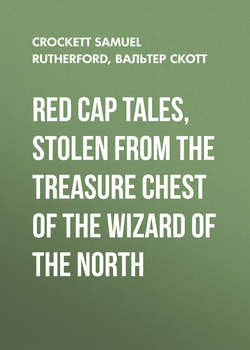Читать книгу Red Cap Tales, Stolen from the Treasure Chest of the Wizard of the North - Вальтер Скотт - Страница 16
RED CAP TALES TOLD FROM WAVERLEY
THE SIXTH TALE FROM "WAVERLEY"
ОглавлениеBLACK LOOKS AND BRIGHT SWORDS
It was in the dusk of an avenue that Evan Dhu had warned Waverley to beware, and ere he had reached the end of the long double line of trees, a pistol cracked in the covert, and a bullet whistled close past his ear.
"There he is," cried Edward's attendant, a stout Merseman of the Baron's troop; "it's that devil's brat, Callum Beg."
And Edward, looking through the trees, could make out a figure running hastily in the direction of the camp of the Mac-Ivors.
Instantly Waverley turned his horse, and rode straight up to Fergus.
"Colonel Mac-Ivor," he said, without any attempt at salutation, "I have to inform you that one of your followers has just attempted to murder me by firing upon me from a lurking-place."
"Indeed!" said the Chief, haughtily; "well, as that, save in the matter of the lurking-place, is a pleasure I presently propose for myself, I should be glad to know which of my clansmen has dared to anticipate me."
"I am at your service when you will, sir," said Edward, with equal pride, "but in the meantime the culprit was your page, Callum Beg."
"Stand forth, Callum Beg," cried Vich Ian Vohr; "did you fire at Mr. Waverley?"
"No," said the unblushing Callum.
"You did," broke in Edward's attendant, "I saw you as plain as ever I saw Coudingham kirk!"
"You lie!" returned Callum, not at all put out by the accusation. But his Chief demanded Callum's pistol. The hammer was down. The pan and muzzle were black with smoke, the barrel yet warm. It had that moment been fired.
"Take that!" cried the Chief, striking the boy full on the head with the metal butt; "take that, for daring to act without orders and then lying to disguise it."
Callum made not the slightest attempt to escape the blow, and fell as if he had been slain on the spot.
"And now, Mr. Waverley," said the Chief, "be good enough to turn your horse twenty yards with me out upon the common. I have a word to say to you."
Edward did so, and as soon as they were alone, Fergus fiercely charged him with having thrown aside his sister Flora in order to pay his court to Rose Bradwardine, whom, as he knew, Fergus had chosen for his own bride.
"It was the Prince—the Prince himself who told me!" added Fergus, noticing the astonishment on Edward's face.
"Did the Prince tell you that I was engaged to Miss Rose Bradwardine?" cried Edward.
"He did—this very morning," shouted Fergus; "he gave it as a reason for a second time refusing my request. So draw and defend yourself, or resign once and forever all claims to the lady."
"In such a matter I will not be dictated to by you or any man living!" retorted Waverley, growing angry in his turn.
In a moment swords were out and a fierce combat was beginning, when a number of Bradwardine's cavalry, who being Lowlanders were always at feud with the Highlandmen, rode hastily up, calling on their companions to follow. They had heard that there was a chance of a fight between their corps and the Highlanders. Nothing would have pleased them better. The Baron himself threatened that unless the Mac-Ivors returned to their ranks, he would charge them, while they on their side pointed their guns at him and his Lowland cavalry.
A cry that the Prince was approaching alone prevented bloodshed. The Highlanders returned to their places. The cavalry dressed its ranks. It was indeed the Chevalier who arrived. His first act was to get one of his French officers, the Count of Beaujeu, to set the regiment of Mac-Ivors and the Lowland cavalry again upon the road. He knew that the Count's broken English would put them all in better humour, while he himself remained to make the peace between Fergus and Waverley.
Outwardly the quarrel was soon made up. Edward explained that he had no claims whatever to be considered as engaged to Rose Bradwardine or any one else, while Fergus sulkily agreed that it was possible he had made a mistake. The Prince made them shake hands, which they did with the air of two dogs whom only the presence of the master kept from flying at each other's throats. Then after calming the Clan Mac-Ivor and riding awhile with the Baron's Lowland cavalry, the Prince returned to the Count of Beaujeu, saying with a sigh, as he reined his charger beside him, "Ah, my friend, believe me this business of prince-errant is no bed of roses!"
It was not long before the poor Prince had a further proof of this fact.
On the 5th of December, after a council at Derby, the Highland chiefs, disappointed that the country did not rally about them, and that the government forces were steadily increasing on all sides, compelled the Prince to fall back toward Scotland. Fergus Mac-Ivor fiercely led the opposition to any retreat. He would win the throne for his Prince, or if he could not, then he and every son of Ivor would lay down their lives. That was his clear and simple plan of campaign. But he was easily overborne by numbers, and when he found himself defeated in council, he shed actual tears of grief and mortification. From that moment Vich Ian Vohr was an altered man.
